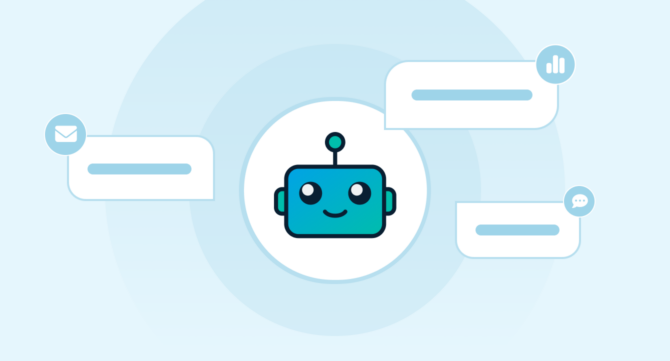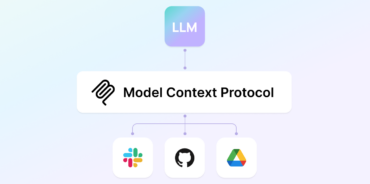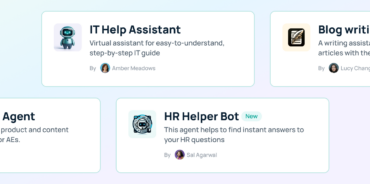What is an AI agent?
An AI agent is a software entity designed to perform tasks autonomously using artificial intelligence (AI) technologies. These agents perceive their environment, make data-based decisions, and execute actions to achieve specific goals.
AI agent systems leverage advanced technologies such as machine learning, natural language processing, and data analysis to interact with humans and systems effectively. They can handle a wide range of specific tasks, from simple data retrieval to complex problem-solving, making them invaluable in various industries.
What AI agents do
AI agents are designed to manage diverse tasks, including customer service, business process automation, data analysis, and even driving cars. By understanding and processing vast amounts of data, AI agents can make informed decisions and perform actions with minimal human intervention. This capability makes them highly efficient and adaptable, allowing businesses to streamline operations and enhance productivity.
In this article, we’ll explore AI agents and how they can help companies transform their productivity.
Types of AI agents
Agents in artificial intelligence come in various forms, each suited for different applications.
| Type | Description | Example |
| Simple reflex agents | Operate based on simple condition-action rules without considering past or future states. | Thermostat adjusting temperature based on readings. |
| Model-based reflex agents | Maintain an internal model of the world to handle partially observable environments. | Self-driving car tracking road conditions. |
| Goal-based agents | Act to achieve specific goals, using planning and optimization techniques. | Delivery drone planning efficient routes. |
| Utility-based agents | Evaluate multiple outcomes to select the one maximizing their utility or satisfaction. | Investment AI agent maximizing portfolio returns. |
| Learning agents | Improve performance over time through machine learning, adapting to new situations. | Recommendation system learning user preferences. |
Simple reflex agents
Simple reflex agents operate based on simple condition-action rules. They respond directly to changes in their environment without considering past states or anticipating future states. These agents are designed to react to specific stimuli with predefined responses. Although they lack the ability to learn from past experiences, they are efficient for straightforward tasks where quick, predefined actions are required.
Example: A thermostat that changes based on real-time measurements.
Model-based reflex agents
Model-based reflex agents maintain an internal model of the world that represents the state of the environment. This model helps the agent to handle partially observable environments by keeping track of unobserved aspects of the environment. They use this internal state to make decisions based on both current perceptions and the history of previous states.
Example: A self-driving car that keeps track of the road conditions and the behavior of surrounding vehicles.
Goal-based agents
Goal-based agents act to achieve specific goals. These agents can consider future states and make decisions that lead them toward achieving their goals. They are capable of planning and executing actions that will bring them closer to their desired outcomes, often using search and optimization techniques.
Example: A delivery drone planning its route to ensure timely and efficient delivery of packages.
Utility-based agents
Utility-based agents are similar to goal-based agents but go a step further by considering multiple possible outcomes and selecting the one that maximizes their utility or satisfaction. These agents use a utility function to evaluate different states and actions, aiming to achieve the best possible outcome according to their defined criteria.
Example: An investment AI agent that evaluates various portfolios to maximize returns based on risk tolerance and market conditions.
Learning agents
Learning agents are equipped with machine learning capabilities, enabling them to improve their performance over time by learning from data sources and experiences. These agents can adapt to new situations, making them ideal for dynamic environments with complex tasks and conditions that change frequently.
Example: A recommendation system that suggests products based on user behavior and preferences learned over time.
How AI agents work
Artificial intelligence agents function through a combination of perception, decision-making, and action. Understanding this process is key to leveraging these tools effectively in any organization.
Perception
AI agents gather data from their environment using various sensors and data sources. This data can include text, images, audio, or any other form of information relevant to their tasks. Advanced technologies like natural language processing (NLP) and computer vision enable agents to understand and interpret complex inputs.
Example: An AI agent using NLP to process and understand customer queries in a support chat.
Decision-making
Based on the collected data, AI agents use AI systems, often incorporating AI models and algorithms, to make decisions. This decision-making process can be guided by predefined condition-action rules or more complex AI-driven logic. The use of machine learning algorithms allows agents to learn from past interactions and improve their decision-making over time.
Example: An AI agent analyzing past sales data to predict future trends and suggest inventory adjustments.
Action
After making a decision, the agent takes appropriate action to achieve its goals. This could involve interacting with users, updating a database, or controlling physical devices. The ability to take autonomous actions based on intelligent decision-making is what makes AI agents powerful tools for automation and efficiency.
Example: An AI agent updating a customer’s order status and notifying them via email.

The benefit of AI agents for enterprise companies
Enterprise companies can reap significant benefits from deploying AI agents – let’s dive into some examples.
Efficiency and productivity
AI agents can handle repetitive and time-consuming tasks, freeing up human employees to focus on more strategic and creative work. By automating routine processes, AI agents increase overall productivity and allow employees to contribute to higher-value activities.
Example: An AI agent automating data entry tasks, allowing employees to focus on data analysis and insights.
Enhanced decision-making
With their ability to process vast amounts of data and generate actionable insights, AI agents can support better decision-making processes. They provide real-time analytics and recommendations, enabling companies to make informed decisions quickly and accurately.
Example: An AI agent analyzing market trends and providing recommendations for product development strategies.
Cost savings
Automating tasks with AI agents can reduce operational costs by minimizing the need for manual intervention and reducing errors. This efficiency leads to significant savings, especially in areas like customer service, data processing, and logistics.
Example: An AI agent handling customer inquiries and support tickets, reducing the need for a large customer service team.
Improved employee experience
AI agents, like AI workplace assistants, can provide timely and personalized support to employees, enhancing efficiency and job satisfaction. They can interact with employees through various channels, offering consistent and accurate information — so employees don’t have to bother their coworkers for the answers they need.
Example: An AI-powered chatbot providing instant responses to employees who have workplace questions.
Building vs. buying AI agents
When considering AI agents, enterprises face a decision: build custom AI agents in-house or purchase ready-made solutions.
| Criteria | Building AI agents | Buying AI agents |
| Customization | High – Tailored to specific needs | Medium – May not fully meet all requirements |
| Control | Full control over data and processes | Can be limited – Dependent on vendor’s features |
| Development cost | High – Significant investment in resources | Low – Reduced initial investment |
| Deployment time | Long – Extensive development and testing | Short – Quick implementation |
| Support | In-house maintenance and updates | Vendor-provided updates and support |
| Proprietary adv. | Unique capabilities and competitive edge | Common features shared with other users |
Ultimately, building an in-house AI agent can take a lot of your team’s time and resources. You may have better control over data and customization, but weighing the costs is important.
A lot of software tools now offer AI agents built into their solutions — so chances are, your team already has access to AI agents within your current tech stack.
If you’re interested in an AI tool that will help your team with knowledge management and efficiency, you should consider enterprise search software.
GoSearch: AI-powered enterprise search
GoSearch is an innovative AI agent designed to enhance productivity and efficiency for enterprise employees. Leveraging advanced AI, including natural language processing and machine learning, GoSearch provides seamless search and data retrieval across an organization’s knowledge base.
With this tool, employees can quickly find the information they need without sifting through endless documents or databases.
Key features of GoSearch
- Natural language processing: Allows users to search using natural language queries, making it easy to find relevant information quickly.
- Machine learning: Continuously improves search results based on user interactions and feedback.
- Integration with enterprise systems: Seamlessly integrates with 100+ workplace apps, providing a unified search experience.
- User-friendly AI assistant: Designed for ease of use, ensuring that employees can quickly adapt to and benefit from the tool.
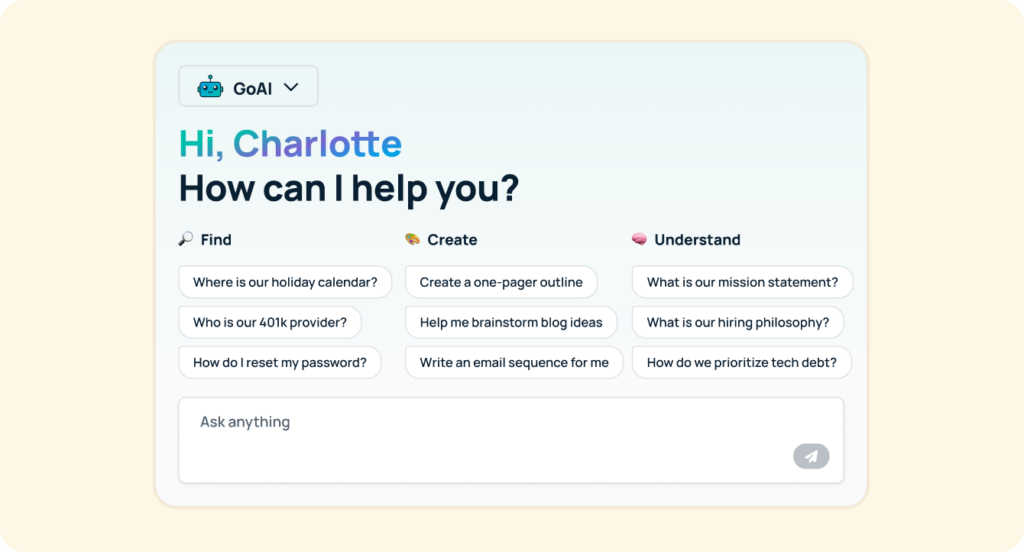
Getting started with AI agents
AI agents are revolutionizing how enterprises operate, offering unmatched efficiency, productivity, and decision-making capabilities. Whether you decide to build your own custom solution or invest in AI solutions like enterprise search, you can leverage these tools to stay ahead of competitors and drive innovation.
Discover how GoSearch can transform your enterprise by simplifying information search and data retrieval for your employees.
Search across all your apps for instant AI answers with GoSearch
Schedule a demo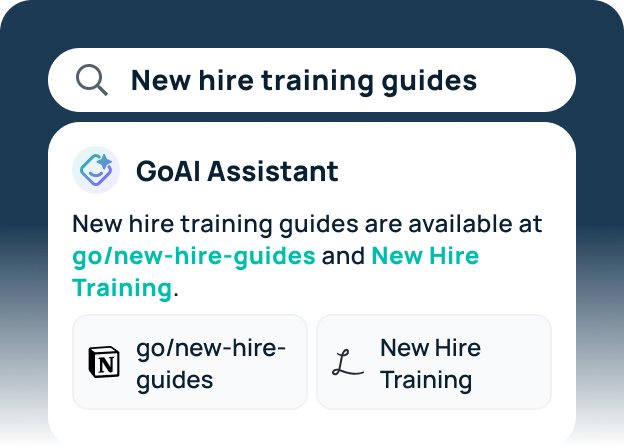
FAQs
What are AI agents?
An AI agent is a software entity that autonomously performs tasks using artificial intelligence, interacting with its environment and making decisions to achieve specific goals.
How do AI agents work?
AI agents perceive their environment, make decisions based on data and AI models, and take actions to achieve their goals.
What are the types of AI agents?
There are various types of AI agents, including reactive, deliberative, learning, collaborative, and mobile agents.
What are the benefits of AI agents for enterprises?
AI agents enhance efficiency, support better decision-making, reduce operational costs, and improve customer experiences.
Should we build or buy AI agents?
Building AI agents offers customization and control but at higher costs and longer deployment times. Buying AI agents offers faster deployment and lower upfront costs.
Is ChatGPT an AI agent?
Yes, ChatGPT can be considered an AI agent as it uses natural language processing to understand and generate human-like text.
How can AI handle complex tasks?
AI handles complex tasks by leveraging advanced technologies like machine learning, natural language processing, and data analysis. These technologies enable agents to process vast amounts of data, learn from past experiences, and make informed decisions to perform intricate and multi-step tasks efficiently.
